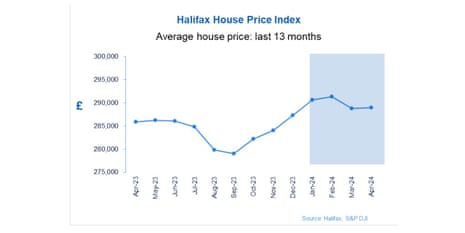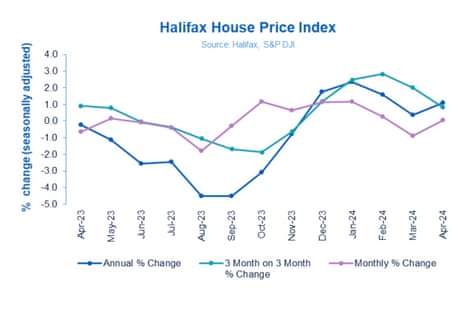Introduction: Halifax reports small rise in UK house prices
Good morning, and welcome to our rolling coverage of busines, the financial markets and the world economy.
Another day, another healthcheck on the UK housing sector.
And this morning, lender Halifax have reported that the market is “finding its feet” in the face of higher borrowing costs.
Halifax’s monthly gauge shows that average house price rose by +0.1% in April on a monthly basis, after a fall of 0.9% in March.
On an annual basis, prices were 1.1% higher than in April 2023 – a time when house price growth was weaker.

This has lifted the average price to £288,949, slightly higher than the £288,781 in March, with growth fastest in Northern Ireland.
This contrasts with rival lender Nationwide, which reported last week that prices dipped by 0.4% in April.
Amanda Bryden, head of mortgages at Halifax, says the average house prices have “largely plateaued” in the early part of 2024, adding:
“This reflects a housing market finding its feet in an era of higher interest rates. While borrowing costs remain more expensive than a few years ago, homebuyers are gaining confidence from a period of relative stability.
Activity and demand is improving, evidenced by greater numbers of mortgage applications so far this year, while at an industry level mortgage approvals have reached their highest point in 18 months.
Bryden adds that first-time buyers have been compensating for higher borrowing costs by targeting smaller properties. That has left to the prices of flats rising faster than larger properties in 2024.

The agenda
-
7am BST: German trade balance for March
-
8.30am BST: Eurozone construction PMI for April
-
9am BST: UK new car sales for April
-
9.30am BST: UK construction PMI for April
-
10am BST: Business and Trade Committee hearing on good work and protecting workers’ rights
-
1.30m BST: BoE policymaker Jonathan Hall gives a speech at the University of Exeter about artificial intelligence, titled ‘Monsters in the deep ….’
Key events
The regional picture
Halifax’s UK house price report shows that annual price falls are predominately found in the south of England, maintaining the ‘North-South’ divide across English regions.
The North West of England continues to see the strongest growth in England, with average prices up by 3.3% on an annual basis to £231,599.
Prices in London are pretty flat over the last year up just 0.1% (with the average at £539,336).
Properties in Eastern England recorded the biggest decline of -1.1%, with homes selling for an average of £329,723, a drop of £3,541 over the last year.
Northern Ireland remains the strongest performing nation or region in the UK, with house prices up by 3.4% over the last year (taking the average to £192,502))
In Wales annual property price growth slowed to +1.1% in April, while prices in Scotland are up 1.5% year-on-year.
According to lender @HalifaxBank the typical UK home found an extra £200 down the sofa, rising 0.1% on last month to £288,949. Annually they increased by 1.1% but this was largely due to weak growth the year before.
Ireland (3.4%) Scotland (+1.5%) Wales (1.1%) & North west… pic.twitter.com/AbcRdUZdoj— Emma Fildes (@emmafildes) May 7, 2024
Halifax: We now expect property prices to rise modestly this year
Despite average house prices inching up in April, Halifax adds that affordability constraints are still a significant challenge.
That applies to new buyers, and also borrowers who are rolling off fixed-term deals, and facing a jump in repayment costs.
Amanda Bryden, Halifax’s head of mortgages, says interest rate cuts later this year should help borrowers:
Mortgage rates have edged up again in recent weeks, primarily as a result of expectations around future Bank of England base rate changes, with markets now pricing in a slower pace of cuts.
If, as is still expected, downward moves in Bank Rate come into play later this year, fixed mortgage rates should fall. Combined with the resilience displayed by the housing market over recent months, we now expect property prices to rise modestly over the course of 2024.”
BP profits miss forecasts as oil and gas trading weakens
In the oil sector, energy giant BP has missed profit forecasts this morning.
BP has reported a drop in profits, with underlying earnings falling to $2.7bn in the first quarter of 2024, down from $2.9bn in the final quarter of 2024.
That’s below analysts forecasts for profits of $2.9bn, and sharply lower than the $4.9bn BP made in Q1 2023, when oil and gas prices were higher.
BP says the drop in profits was due to weaker oil and gas trading, “significantly weaker” profit margins at its fuels division, and the disruption at its Whiting refinery outage in northwest Indiana which shut down for several weeks due to a power outage.
But despite this drop in profits, BP is continuing to pump money to shareholders. It has annouced a new $1.75bn share buyback this morning.
Kate Thomson chief financial officer at BP, says:
bp reported solid financial performance in the first quarter with adjusted EBITDA* of $10.3 billion and underlying replacement cost profit of $2.7 billion.
Our financial frame is unchanged, and we are delivering competitive shareholder distributions, announcing a $1.75 billion share buyback for the first quarter as part of our commitment of $3.5 billion for the first half of 2024.
Introduction: Halifax reports small rise in UK house prices
Good morning, and welcome to our rolling coverage of busines, the financial markets and the world economy.
Another day, another healthcheck on the UK housing sector.
And this morning, lender Halifax have reported that the market is “finding its feet” in the face of higher borrowing costs.
Halifax’s monthly gauge shows that average house price rose by +0.1% in April on a monthly basis, after a fall of 0.9% in March.
On an annual basis, prices were 1.1% higher than in April 2023 – a time when house price growth was weaker.
This has lifted the average price to £288,949, slightly higher than the £288,781 in March, with growth fastest in Northern Ireland.
This contrasts with rival lender Nationwide, which reported last week that prices dipped by 0.4% in April.
Amanda Bryden, head of mortgages at Halifax, says the average house prices have “largely plateaued” in the early part of 2024, adding:
“This reflects a housing market finding its feet in an era of higher interest rates. While borrowing costs remain more expensive than a few years ago, homebuyers are gaining confidence from a period of relative stability.
Activity and demand is improving, evidenced by greater numbers of mortgage applications so far this year, while at an industry level mortgage approvals have reached their highest point in 18 months.
Bryden adds that first-time buyers have been compensating for higher borrowing costs by targeting smaller properties. That has left to the prices of flats rising faster than larger properties in 2024.
The agenda
-
7am BST: German trade balance for March
-
8.30am BST: Eurozone construction PMI for April
-
9am BST: UK new car sales for April
-
9.30am BST: UK construction PMI for April
-
10am BST: Business and Trade Committee hearing on good work and protecting workers’ rights
-
1.30m BST: BoE policymaker Jonathan Hall gives a speech at the University of Exeter about artificial intelligence, titled ‘Monsters in the deep ….’






